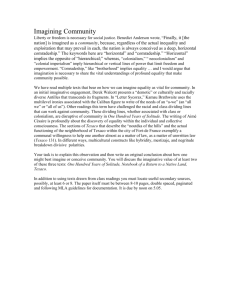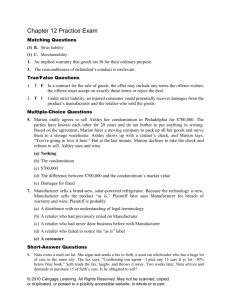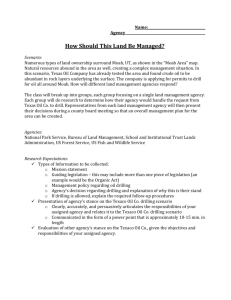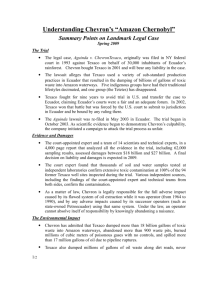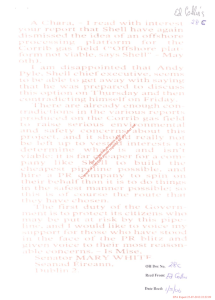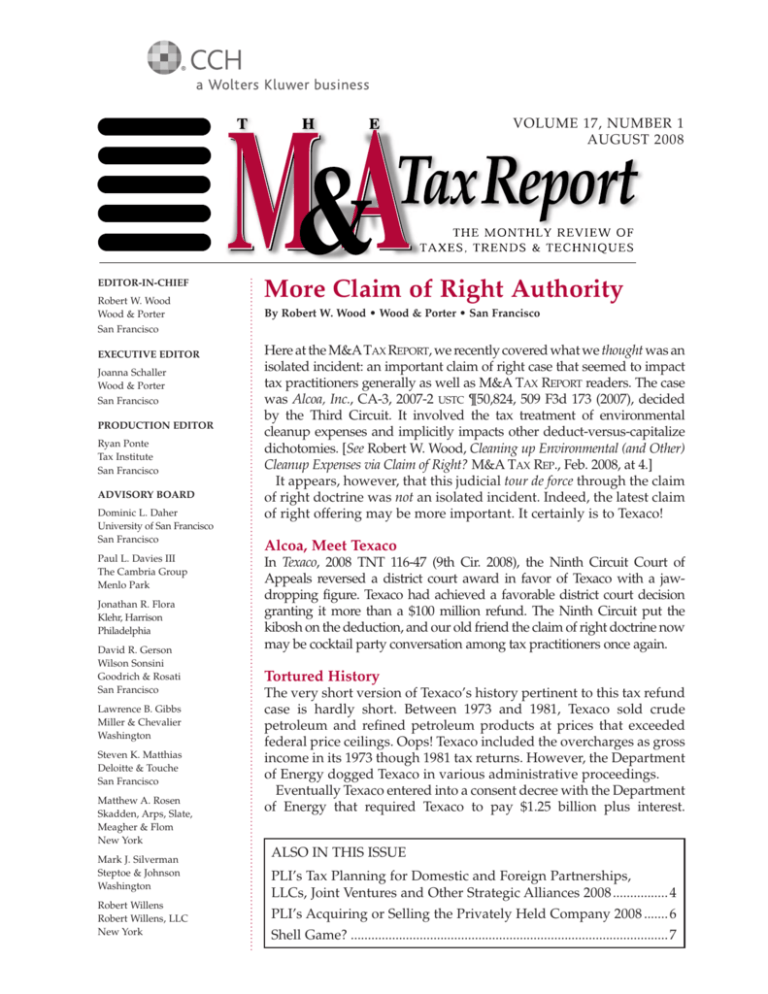
VOLUME 17, NUMBER 1
AUGUST 2008
EDITOR-IN-CHIEF
Robert W. Wood
Wood & Porter
San Francisco
EXECUTIVE EDITOR
Joanna Schaller
Wood & Porter
San Francisco
PRODUCTION EDITOR
Ryan Ponte
Tax Institute
San Francisco
ADVISORY BOARD
Dominic L. Daher
University of San Francisco
San Francisco
Paul L. Davies III
The Cambria Group
Menlo Park
Jonathan R. Flora
Klehr, Harrison
Philadelphia
David R. Gerson
Wilson Sonsini
Goodrich & Rosati
San Francisco
Lawrence B. Gibbs
Miller & Chevalier
Washington
Steven K. Matthias
Deloitte & Touche
San Francisco
Matthew A. Rosen
Skadden, Arps, Slate,
Meagher & Flom
New York
Mark J. Silverman
Steptoe & Johnson
Washington
Robert Willens
Robert Willens, LLC
New York
More Claim of Right Authority
By Robert W. Wood • Wood & Porter • San Francisco
Here at the M&A TAX REPORT, we recently covered what we thought was an
isolated incident: an important claim of right case that seemed to impact
tax practitioners generally as well as M&A TAX REPORT readers. The case
was Alcoa, Inc., CA-3, 2007-2 USTC ¶50,824, 509 F3d 173 (2007), decided
by the Third Circuit. It involved the tax treatment of environmental
cleanup expenses and implicitly impacts other deduct-versus-capitalize
dichotomies. [See Robert W. Wood, Cleaning up Environmental (and Other)
Cleanup Expenses via Claim of Right? M&A TAX REP., Feb. 2008, at 4.]
It appears, however, that this judicial tour de force through the claim
of right doctrine was not an isolated incident. Indeed, the latest claim
of right offering may be more important. It certainly is to Texaco!
Alcoa, Meet Texaco
In Texaco, 2008 TNT 116-47 (9th Cir. 2008), the Ninth Circuit Court of
Appeals reversed a district court award in favor of Texaco with a jawdropping figure. Texaco had achieved a favorable district court decision
granting it more than a $100 million refund. The Ninth Circuit put the
kibosh on the deduction, and our old friend the claim of right doctrine now
may be cocktail party conversation among tax practitioners once again.
Tortured History
The very short version of Texaco’s history pertinent to this tax refund
case is hardly short. Between 1973 and 1981, Texaco sold crude
petroleum and refined petroleum products at prices that exceeded
federal price ceilings. Oops! Texaco included the overcharges as gross
income in its 1973 though 1981 tax returns. However, the Department
of Energy dogged Texaco in various administrative proceedings.
Eventually Texaco entered into a consent decree with the Department
of Energy that required Texaco to pay $1.25 billion plus interest.
ALSO IN THIS ISSUE
PLI’s Tax Planning for Domestic and Foreign Partnerships,
LLCs, Joint Ventures and Other Strategic Alliances 2008 ................ 4
PLI’s Acquiring or Selling the Privately Held Company 2008 ....... 6
Shell Game? ............................................................................................ 7
T H E
M & A
T A X
R E P O R T
the statute was ambiguous. Plus, other sources
(including the legislative history) suggested that
Texaco was right that Code Sec. 1341(b)(2) only
prohibited using Code Sec. 1341 for “sales returns,
allowances and similar items.”
Texaco made the payments and deducted the
settlement amount for the years in question as
ordinary and necessary business expenses.
In 2001, Texaco filed refund claims for its
1988, 1990, 1991 and 1992 tax years. The theory
of the refund claims was that the tax benefit of
the ordinary and necessary business expense
deductions should have been calculated under
Code Sec. 1341. The government denied the
refund claims, so in 2004, Texaco filed suit in
district court.
On cross motions for summary judgment, the
district court concluded that Code Sec. 1341(b)(2)
did not preclude Texaco from reaping the benefits
of Code Sec. 1341(a). The Code Sec. 1341(b)(2)
subsection in question says that Code Sec. 1341
does not apply with respect to an item included in
gross income by reason of a sale of inventory. The
district court said this provision did not apply
(to preclude Code Sec. 1341 benefits) because
Back to Basics
THE M&A TAX REPORT (ISSN 1085-3693) is published monthly
by CCH, 4025 W. Peterson Ave., Chicago, Illinois 60646.
Subscription inquiries should be directed to
4025 W. Peterson Ave., Chicago, IL 60646.
Telephone: (800) 449-8114. Fax: (773) 866-3895. Email: cust_serv@cch.com.
©2008 CCH. All Rights Reserved.
The Ninth Circuit started its romp through the
history of the claim of right doctrine with U.S.
Supreme Court cases from the 1930s. Then,
in 1951, the U.S. Supreme Court observed
that a taxpayer who is required in a later
year to restore to a third-party income it
previously received is entitled to a deduction
if the payment is deductible under some other
provision of the Internal Revenue Code. [See
E.R. Lewis, SCt, 51-2 USTC ¶9211, 340 US 590
(1951).] The understandable goal is to provide
fairness to a taxpayer who is whipsawed
between multiple years, and who may not get
the full measure of an appropriate deduction
in the later year.
Code Sec. 1341 essentially bridges that divide.
After all, absent this statutory provision, a
deduction in the year of repayment may result
in a savings that is less—perhaps enormously
less—than the amount of increased tax as
a result of the taxpayer’s original inclusion
of the amount. With Code Sec. 1341, the
taxpayer is able to recover the taxes he paid
in the initial year.
Whether this is good tax policy or not is
not relevant. Arguably, there is some degree
of manipulation permissible because taxpayers
usually can choose to apply or not to apply the
provision. Yet, as the Third Circuit recently noted
in Alcoa, allowing the taxpayer a choice between
a simple deduction and a recalculation of the
prior year’s tax liability ensures that any change
in rates (or in the taxpayer’s tax bracket) is tax
neutral. [See Alcoa, supra, 509 F3d 173, 177.]
Permissions requests: Requests for permission to reproduce content
should be directed to CCH, permissions@cch.com.
Inventory Sale
EDITOR-IN-CHIEF
Robert W. Wood
MANAGING EDITOR
Kurt Diefenbach
COORDINATING EDITOR
Tara Fenske
PRODUCTION EDITOR
Don Torres
M&A Tax Report is designed to provide accurate and authoritative
information in regard to the subject matter covered. It is sold with
the understanding that the publisher is not engaged in rendering
legal, accounting, or other professional service. If legal advice or other
expert assistance is required, the services of a competent professional
person should be sought—From a Declaration of Principles jointly
adopted by a Committee of the American Bar Association and a
Committee of Publishers.
The sole (but very large) legal question present
in Texaco was whether Code Sec. 1341(b)(2) took
away the applicability of Code Sec. 1341 on
Texaco’s facts. Interestingly, Texaco conceded that
during 1973 through 1981, all of Texaco’s sales of
crude oil and petroleum products were sales
of inventory. Because the income in question
arose out of inventory sales, the IRS asserted that
Texaco was barred from using Code Sec. 1341(a).
Photocopying or reproducing in any form in whole or in part is a
violation of federal copyright law and is strictly forbidden without
the publisher’s consent. No claim is made to original governmental
works; however, within this product or publication, the following
are subject to CCH’s copyright: (1) the gathering, compilation,
and arrangement of such government materials; (2) the magnetic
translation and digital conversion of data, if applicable; (3) the
historical, statutory, and other notes and references; and (4) the
commentary and other materials.
2
T H E
M & A
T A X
R E P O R T
a kind that would have been included in the
taxpayer’s inventory if on-hand at the close of
the prior taxable year) or property held by the
taxpayer primarily for sale to customers in the
ordinary course of its trade or business. [Id.]
Texaco noted with more than a little irony
that Rev. Rul. 2004-17 was issued on February
6, 2004, shortly after Texaco had filed its
complaint in federal district court. Good
Thus, the question was what Congress meant by
the inventory exclusion in Code Sec. 1341(b)(2).
Statutory meaning involves language, and
the Ninth Circuit’s Texaco opinion contains
enough mention of grammar, construction
and syntax to make an English major proud.
A good bit of the opinion talks about plain
meaning, which words and phrases modify
others, and stylistic discussion of similar ilk.
There is also discussion of the regulations
under Code Sec. 1341, with a similar sentence
structure and syntax bent.
Quoting from another oil company case,
Pennzoil-Quaker State, Co., FedCl, 2008-1
USTC ¶50,131, 511 F3d 1365 (2008), the court
even included citations to a stylebook on the
meaning and use of the word “therefore.” [See
Bryan A. Garner, THE ELEMENTS OF LEGAL STYLE
141 (1941), quoted in Pennzoil-Quaker State, Co.,
supra, 511 F3d 1365, 1372.]
Ultimately, the Ninth Circuit (rightly or wrongly)
concluded that the language and meaning of
Code Sec. 1341(b)(2) was clear, and did not suffer
from ambiguity. To the court, the conclusion that
Code Sec. 1341(b)(2) is plain and unambiguous
meant that several Texaco arguments would
be discarded. Predictably, Texaco argued about
Congress’s intent in enacting Code Sec. 1341,
and there was (in my view anyway) at least some
support for this notion.
Still, the Ninth Circuit was not persuaded,
finding that such arguments could not overcome
what it found to be the plain meaning of
Code Sec. 1341(b)(2). That plain meaning nixed
Texaco’s outsized $100 million–plus claim.
To the court, the
conclusion that Code
Sec. 1341(b)(2) is plain
and unambiguous
meant that several
Texaco arguments
would be discarded.
timing! Texaco argued that a revenue ruling
issued during the pendency of litigation has
no power to persuade. The Ninth Circuit gave
a somewhat muddled answer to this, but
seemed to view this primarily as a question
of degree. The Ninth Circuit said it could and
would consider the conclusion of the revenue
ruling notwithstanding timing, especially
since the Ninth Circuit found that the ruling
was not based on the facts in Texaco’s case.
Continued Viability
As we noted recently in connection with the
Alcoa case, the claim of right doctrine (and
the relief that Code Sec. 1341 affords) is not
for everyone. It is tough and tricky. In fact,
complying with Code Sec. 1341 to achieve
the equalization Congress intended can be a
steeplechase. That was clear in Alcoa, and it is
doubly clear in Texaco.
The Assistant Attorney General of the Justice
Department’s Tax Division, Nathan Hochman,
even issued a press release about this important
government victory. Hochman stated that
the Ninth Circuit respected plain statutory
language, and had deferred to the IRS, which
after all, is entrusted with enforcing the Code.
Boy, whoever said the Ninth Circuit was the
“Taxpayer’s Circuit”?
IRS Too
Toward the end of the Ninth Circuit’s opinion,
the court also notes (more than apocryphally)
that the IRS had issued Rev. Rul. 2004-17,
2004-1 CB 516. Although Texaco suggested that
the ruling was “an unreasoned afterthought,”
the Ninth Circuit found this clear enunciation
of this IRS policy was significant. The IRS is,
after all, the agency charged with interpreting
these laws and enforcing them.
This revenue ruling says plainly that the
prohibition in Code Sec. 1341(b)(2) makes
Code Sec. 1341(a) inapplicable:
with respect to an item included in gross income
by reason of the sale or other disposition of the
taxpayer’s stock in trade (or other property of
3

